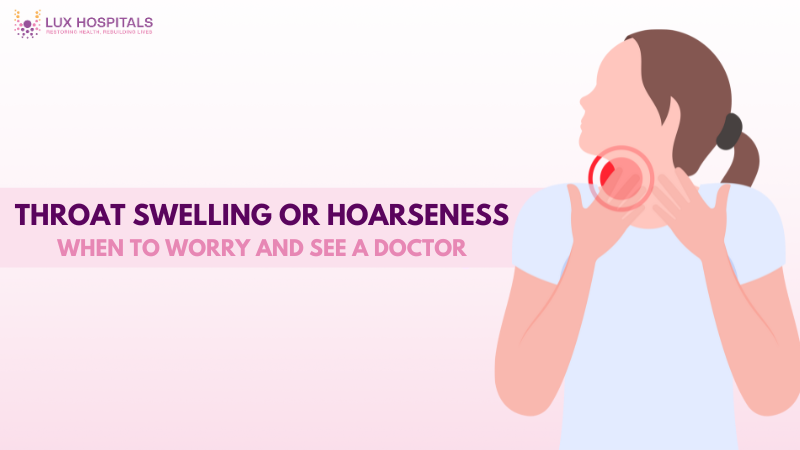Throat Swelling or Hoarseness? Know the Warning Signs

It can be scary to have throat pain, especially if it comes with hoarseness or visible swelling. Even though these symptoms are frequently transient and benign, they can occasionally be signs of more serious illnesses. Determining when to seek medical assistance requires knowing the warning signals and potential reasons. This post will review common reasons for throat swelling and hoarseness, how to evaluate your symptoms, and when to consult a physician.
Common Causes of Throat Swelling and Hoarseness
Throat swelling and hoarseness can result from various conditions, from minor infections to serious health issues. Common causes include
- Viral or bacterial infections like colds, the flu, or strep throat. Colds, the flu, and strep throat are bacterial or viral infections.
- Allergies cause inflammation and vocal cord irritation.
- Overuse of the voice, such as shouting or prolonged speaking
- Gastroesophageal reflux disease (GERD) irritates the vocal cords.
- Smoking or exposure to environmental irritants
- Thyroid issues or growths in the neck
- Tumours or cancer of the larynx or the surrounding areas
These conditions may lead to hoarseness, swelling, swallowing pain, or difficulty breathing.
Recognizing Serious Symptoms
While some throat symptoms resolve independently, others may indicate an underlying medical problem. You should watch for:
- Persistent hoarseness lasting more than two weeks
- Difficulty breathing or swallowing
- Visible neck swelling or a lump that doesn’t go away
- Weight loss or chronic fatigue
- Coughing up blood or an ongoing dry cough
Suppose you experience hoarseness with any of these symptoms. In that case, seeing a doctor immediately is essential because it can indicate a more serious illness.
When Is Hoarseness Just Temporary?
Hoarseness often results from inflammation or irritation of the vocal cords. This can occur after:
- Yelling or talking for long periods
- A viral upper respiratory infection
- Breathing dry or polluted air
- Smoking or secondhand smoke exposure
In these cases, hoarseness usually improves with rest, hydration, and vocal care within a few days. Warm fluids and avoiding whispering (which strains the voice) can help recovery.
When to See a Doctor for Hoarseness or Swelling?
Consult a healthcare professional if:
- Hoarseness lasts longer than two weeks
- Throat swelling is painful or visibly growing
- Your voice suddenly changes without a clear cause
- You feel a lump in your neck
- You experience difficulty swallowing or breathing
These signs might indicate thyroid issues, vocal cord nodules, or even throat cancer. Early diagnosis and successful therapy can result from prompt evaluation.
Diagnosing the Cause of Hoarseness
Doctors may use several tools to diagnose the cause of hoarseness, including
- Laryngoscopy, where a camera is inserted to view the vocal cords
- Blood tests to detect infection or thyroid issues
- Imaging examinations, such as CT or MRI scans, for neck swelling
- Biopsy, if a mass or growth is detected
Additionally, your physician will inquire about your lifestyle, medical history, and how long you’ve experienced symptoms.
Treatment Options for Throat Swelling and Hoarseness
Treatment depends on the underlying cause:
- Viral infections usually improve with rest and fluids
- Bacterial infections may require antibiotics
- Reflux-related hoarseness can be treated with antacids and dietary changes
- Vocal strain often improves with vocal rest and speech therapy
- Severe conditions, such as cancer, may require surgery, radiation, or other interventions
In all cases, avoiding smoking and staying hydrated helps the healing process and supports vocal health.
Preventing Throat Problems
To reduce the risk of hoarseness and throat swelling:
- Avoid yelling or overusing your voice
- Quit smoking and avoid secondhand smoke
- Stay hydrated to keep vocal cords lubricated
- Use a humidifier in dry environments
- Avoid spicy foods or large meals before bed if you have reflux
- Get vaccinated against common infections like the flu
By taking these preventive steps, you can reduce your chances of developing chronic hoarseness or throat inflammation.
Conclusion
Hoarseness and swelling in the throat might be modest and transient or signs of a more serious illness. You may safeguard your vocal health and avoid issues by knowing when to rest your voice and when to seek medical assistance. If your hoarseness or throat swelling doesn’t improve in two weeks, or if you’re experiencing other concerning symptoms, don’t delay see a doctor for proper diagnosis and treatment
Frequently Asked Questions
Hoarseness lasting more than a week may be due to vocal cord strain, chronic reflux, allergies, or infections. It could also signal a more serious issue, like vocal cord nodules or thyroid problems. If it persists beyond two weeks, it’s best to see a doctor for evaluation.
Yes, throat swelling is often caused by infections like tonsillitis, strep throat, or viral colds. The swelling typically comes with pain, fever, or hoarseness. If the swelling doesn’t improve or gets worse, seek medical care.
GERD can lead to hoarseness and throat irritation, as stomach acid reaches the vocal cords, causing inflammation, especially in the morning. Managing GERD with medication and diet can improve symptoms.
Hoarseness becomes a concern when it lasts longer than two weeks, especially with no apparent cause. Medical evaluation is needed if it’s accompanied by pain, difficulty swallowing, or a neck lump. Persistent hoarseness may indicate severe conditions like vocal cord paralysis or cancer.
Yes, allergies can cause throat swelling and hoarseness by irritating the vocal cords. This often occurs with postnasal drip and nasal congestion. Treating allergies with antihistamines and avoiding triggers helps reduce symptoms.
Thyroid disorders, especially thyroid nodules or enlargement, can cause hoarseness by pressing on the vocal cords. Swelling in the neck may also be present. A doctor can evaluate thyroid function and recommend further tests if needed.




















